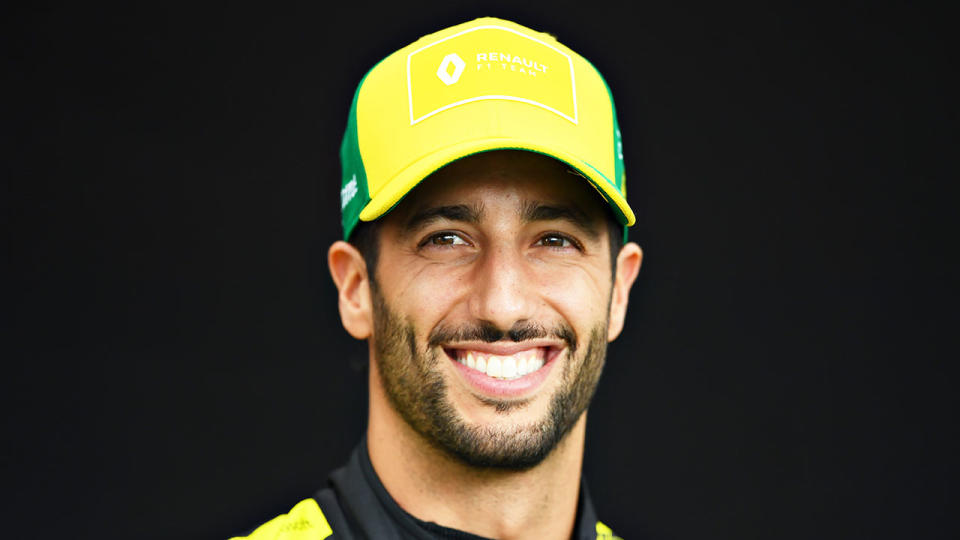'He is willing': Daniel Ricciardo's selfless act amid virus crisis

Daniel Ricciardo will take a pay cut to help Renault through the coronavirus pandemic but talks about his future are already complicated, according to his Formula One team boss Cyril Abiteboul.
The Australian is one of the sport's highest paid drivers, earning as much as $US25 million ($A39 million) a year according to media reports.
'GOING TO BE A CHALLENGE': F1 star's stunning switch to Aussie Supercars
‘NEVER UNDERSTOOD’: F1 great's Vettel conspiracy theory
Abiteboul told French newspaper L'Equipe that Ricciardo's salary would not be a destabilising factor after the French carmaker furloughed most of their F1 staff at the Enstone factory in central England.
"It's a discussion we've already had. Daniel has already confirmed he is willing...I can confirm to you that he will reduce it," said the Frenchman.
Asked whether the 30-year-old's wages could pose an image problem, Abiteboul replied: "The problem would have been if he had not accepted the idea.
"We still have to fix the terms but, in principle, I can reassure the Renault group management committee; I do not fear it will destabilise the F1 program."
Ricciardo joined Renault from Red Bull last year with a contract that runs to the end of 2020.
With the F1 season yet to start, and some fearing this year's championship may have to be scrapped altogether, Renault could end up having to pay the 30-year-old handsomely for little return.
They may also have to make tough choices when it comes to contract negotiations.
"In a normal season, we would have started work on the matter," said Abiteboul.
"We would have evaluated Daniel's performance over the first four races and started or not the first discussions.
"We haven't turned a wheel. We are blind but have to plan," he added. "We may have to take decisions without the season starting."
Asked whether it was a problem if Ricciardo left, the Frenchman replied: "It would be if I had not seen it coming or anticipated it. That's why we are having discussions and have a driver academy."
F1's season-opening race in Melbourne on March 15 was cancelled with the Monaco Grand Prix also subsequently axed. Seven other races have been postponed and more are likely to join the queue for rescheduling.
F1 has said it hopes to run a reduced calendar of 15-18 races from the European summer.
Motorsport rocked by death of British legend Stirling Moss
The motorsport community has been paying tribute to Stirling Moss after the British legend died aged 90, earlier in the week.
Moss was a daring, speed-loving Englishman regarded as the greatest Formula One driver never to win the world championship.
A national treasure, affectionately known as 'Mr. Motor Racing', he was fearless and fiercely competitive. The balding Moss' taste for adventure saw him push cars to their limits.
"If you're not trying to win at all costs," he said, "what on earth are you doing there?"
His often reckless attitude took a toll on his slight body. His career ended early, at age 31, after a horrific crash left him in a coma for a month in April 1962.
By then, Moss had won 16 of the 66 F1 races he entered and established a reputation as a technically excellent and versatile driver across many racing categories.
Arguably his greatest achievement was victory in the 1955 Mille Miglia - a 1600km road race through Italy - by nearly half an hour over Juan Manuel Fangio, the Argentine great who was Moss' idol, teammate and rival.
An F1 title didn't follow, though - a travesty to many in motorsport. Moss finished second in the drivers' championship four times (1955-58) and third on three occasions.
In 1958, Moss lost out to Ferrari's Mike Hawthorn by one point despite winning four races to his rival's one. In 1959, Moss' car failed during the final race, in Florida, when leading and again in with a chance of the title.
"I hope I'll continue to be described as the greatest driver who never won the world championship, but it doesn't really matter," Moss once said. "The most important thing for me was gaining the respect of the other drivers and I think I achieved that."
When his resolve to drive solely for English teams waned, Moss raced for Maserati, Ferrari and Mercedes-Benz - partnering Fangio in an all-star line-up. In total, Moss raced in 107 different types of car and boasted a record of 212 wins in the 375 competitive races he finished.
Moss was born in 1929 into a racing family. His father, Alfred, competed in the Indianapolis 500; his mother, Aileen, was English women's champion in 1936. The young Moss learned his trade during a racing boom in England after World War II.
His knowledge of racing cars was second to none and he took his profession to the extreme, experimenting and risking his own safety in the process.
He broke both legs and damaged his spine in a crash in 1960. Even worse was the accident in Goodwood, England, two years later, when he careered into a bank of earth at 160 km per hour without a seatbelt while competing in the Formula One Glover Trophy.
It took 45 minutes to cut him from the wreckage. He suffered brain injuries, and his body's left side was partially paralysed for six months. With his eyesight and reflexes also permanently damaged, Moss quit racing.
"I knew that if I didn't get out, I'd kill myself and maybe somebody else," Moss said.
Moss then became a successful businessman, selling property and designing gadgets out of his state-of-the-art home in central London and working as a consultant to car manufacturers. He received a knighthood in 1999.

